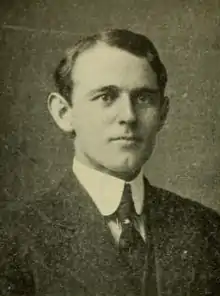John W. Haigis
John William Haigis, Sr. (July 31, 1881 – 1960) was an American newspaper publisher, businessman and politician. Haigis was the editor and publisher of the Greenfield Recorder. Haigis was the founder of WHAI radio.
John W. Haigis, Sr. | |
|---|---|
 | |
| Treasurer and Receiver General of Massachusetts | |
| In office 1928–1930 | |
| Governor | Alvan T. Fuller Frank G. Allen |
| Preceded by | William S. Youngman |
| Succeeded by | Charles F. Hurley |
| Massachusetts State Senate | |
| In office 1923–1927 | |
| Massachusetts State Senate | |
| In office 1913–1915 | |
| Massachusetts House of Representatives 3rd Franklin District[1] | |
| In office 1909–1913 | |
| Town of Montague, Massachusetts Board of Water Commissioners | |
| In office 1910–1915 | |
| Town of Montague, Massachusetts Assessor | |
| In office 1908–1908 | |
| Town of Montague, Massachusetts Auditor | |
| In office 1907–1907 | |
| Town of Montague, Massachusetts Treasurer and Collector | |
| In office 1903–1906 | |
| Personal details | |
| Born | July 31, 1881[1] Montague, Massachusetts Turners Falls |
| Died | 1960 |
| Resting place | Green River Cemetery, Greenfield, Massachusetts |
| Political party | Republican |
| Spouse(s) | Rose Grace Luippold |
| Children | Elizabeth Lucretia Haigis, John William Haigis Jr. (19 Feb 1917 - 27 Oct 1988), Rose Margaret Haigis (23 May 1920 - 25 Apr 1992) |
| Profession | Publisher and Banker |
Marriage and family
On December 3, 1913, Haigis married Rose Grace Luippold, daughter of Johann Martin Luippold and Elizabeth E. Jacobus, in Montague, Massachusetts. They had three children Elizabeth Lucretia Haigis, John William Haigis Jr. and Rose Margaret Haigis.
Town of Montague public offices
From 1903 to 1908 Haigis served in various town offices in the Town of Montague, Massachusetts. He successively served in the capacities as the town's Treasurer, Tax Collector, Auditor, Assessor and Water Commissioner.
Massachusetts State offices
Haigis served as a member of the Massachusetts House of Representatives, Massachusetts State Senate, and the Treasurer and Receiver-General of Massachusetts from 1929 to 1931.
In 1934 Haigis was the Republican party nominee for Lieutenant Governor, and in 1936 for the Republican nominee for Governor, he lost both elections.
Haigis also served as a trustee of the University of Massachusetts Amherst from 1940-1956. Haigis Mall on the campus is named for him.
WHAI
On March 1, 1937, Haigis applied to the FCC for a permit to construct a radio station, the application was to construct a radio station in Greenfield that would operate on 1210 kHz, 250 watts power daytime.[2]
Haigis was granted a license for a radio station call sign WHAI. According to the Springfield (MA) Republican, the station made its debut on March 16, 1938.
In 1938 it was recommended that WHAI be allowed to broadcast on unlimited basis, instead of being restricted to daytime broadcast.[3]
Death and interment
Haigis died in 1960, and was buried in Green River Cemetery, Greenfield, Massachusetts.[4]
References
- Who's Who in State Politics, 1911, Boston, MA: Practical Politics, 1911, p. 170.
- Christian Science Monitor (March 1, 1937), Haigis Asks Radio Permit For Greenfield Station, Boston, MA: Christian Science Monitor, p. 11
- Christian Science Monitor (December 29, 1938), More Time for WHAI, Boston, MA: Christian Science Monitor, p. 9
- Fritz, Anita (October 27, 2007), Family of late Gov. Washburn attends graveside rededication, Greenfield, MA: The Recorder, p. 11
Bibliography
- Haigis papers at the University of Massachusetts Amherst. Includes a biographical note.
- A Souvenir of Massachusetts legislators, page 94, (1915).
- Who's who in New England By Albert Nelson Marquis, page 494 (1915).
- Who's who in state politics, page 170, (1911).
- Who's who in state politics page 75, (1915).
| Party political offices | ||
|---|---|---|
| Preceded by Gaspar G. Bacon |
Republican nominee for Governor of Massachusetts 1936 |
Succeeded by Leverett Saltonstall |
| Political offices | ||
| Preceded by William S. Youngman |
Treasurer and Receiver-General of Massachusetts 1928 – 1930 |
Succeeded by Charles F. Hurley |